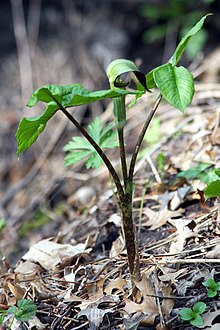Arisaema triphyllum
| Jack-in-the-pulpit | |
|---|---|
 |
|
| Scientific classification | |
| Kingdom: | Plantae |
| (unranked): | Angiosperms |
| (unranked): | Monocots |
| Order: | Alismatales |
| Family: | Araceae |
| Subfamily: | Aroideae |
| Tribe: | Arisaemateae |
| Genus: | Arisaema |
| Species: | A. triphyllum |
| Binomial name | |
|
Arisaema triphyllum L. |
|
| Synonyms | |
|
|
Arisaema triphyllum (jack-in-the-pulpit, bog onion, brown dragon, Indian turnip, American wake robin, or wild turnip) is a herbaceous perennial plant growing from a corm. It is a highly variable species typically growing 30–65 centimetres (12–26 in) in height with three-parted leaves and flowers contained in a spadix that is covered by a hood. It is native to eastern North America, occurring in moist woodlands and thickets from Nova Scotia west to Minnesota, and south to southern Florida and Texas.
The leaves are trifoliate, with groups of three leaves growing together at the top of one long stem produced from a corm; each leaflet is 8–15 centimetres (3.1–5.9 in) long and 3–7 centimetres (1.2–2.8 in) broad. Plants are sometimes confused with Poison-ivy especially before the flowers appear or non-flowering plants. The inflorescences are shaped irregularly and grow to a length of up to 8 cm long. They are greenish-yellow or sometimes fully green with purple or brownish stripes. The spathe, known in this plant as "the pulpit" wraps around and covers over and contain a spadix ("Jack"), covered with tiny flowers of both sexes. The flowers are unisexual, in small plants most if not all the flowers are male, as plants age and grow larger the spadix produces more female flowers. This species flowers from April to June. It is pollinated by flies, which it attracts by smell. The fruit are smooth, shiny green, 1 cm wide berries clustered on the thickened spadix. The fruits ripen in late summer and fall, turning a bright red color before the plants go dormant. Each berry produces 1 to 5 seeds typically, the seeds are white to light tan in color, rounded, often with flattened edges and a short sharp point at the top and a rounded bottom surface. If the seeds are freed from the berry they will germinate the next spring, producing a plant with a single rounded leaf. Seedlings need three or more years of growth before they become large enough to flower.
...
Wikipedia

